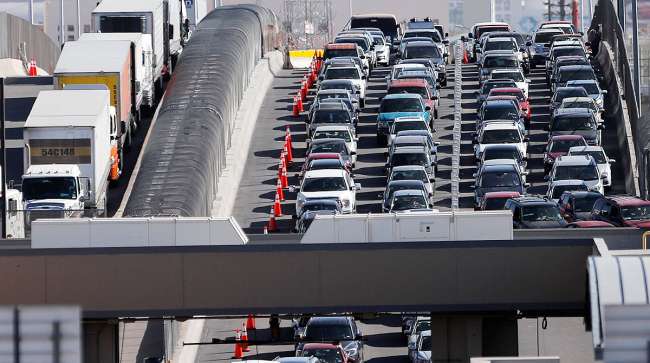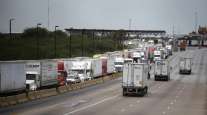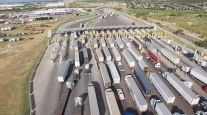Senior Reporter
Trump Softens Position Toward Closing US-Mexico Border

President Donald Trump on April 4 said he will delay closing the U.S.-Mexico border for one year, just days after it was announced he would seal the southern border as early as this week.
Trucking and transportation leaders were among several groups expressing concern over the economic impact of a shutdown if the president had followed through with his declaration.
Now, the president said he will give Mexico a year to stop the flow of illegal drugs into the United States. Should that not happen, the White House first will impose tariffs on imported autos and, if that fails, the border will be closed.
“That will be a very powerful incentive,” he said. “I will do it, I don’t play games.”
Experts who spoke with Transport Topics said the economic impact of slowing the flow of freight between the countries would be significant.

Costello
“Hopefully, there will not be a border-crossing closure on the U.S.-Mexico border, but if there is, we hope commercial truck traffic will be excluded,” ATA Chief Economist Bob Costello told TT. “Free, open and fair trade is incredibly important to the U.S. economy and especially to the trucking industry, and any serious disruption of economic activity between us and one of our closest trading partners would have serious impacts — up to $18 million a day in lost revenue — on trucking.”
Rajeev Dhawan, director of the Economic Forecasting Center at Georgia State University in Atlanta, told TT, “A temporary shutdown would not cause much of a problem, but if it is a long one, the supply chains will get messed up and that’s where the problems come in. People keep supplies for two or three days, and they can handle that. But if it’s going to be two or three weeks, things will shut down.”
According to the U.S. Department of Commerce, after China and Canada, Mexico is the United States’ third-largest trading partner. About $1.5 billion a day in commerce flows at locations along the nearly 2,000-mile border between the nations. The amount of trade has steadily increased since the 1990s, when the North American Free Trade Agreement was ratified by the United States, Mexico and Canada.
One of the biggest areas of growth has been the production of automotive parts that are shipped between the United States and Mexico. The Commerce Department said, in 2018, U.S. producers relied on more than $112 billion in automotive and parts imports and an additional $36 billion in exports that crossed the U.S.-Mexico border, much of it by truck and rail.
“For the automobile industry … things go back and forth multiple times. The seats in a car are made in multiple places between the U.S. and Mexico. It goes back and forth several times before it is a seat and shipped to, let’s say, Detroit,” Dhawan said. “The auto industry works with just-in-time inventory, and they don’t keep a lot of inventory.”
Congress must get together and immediately eliminate the loopholes at the Border! If no action, Border, or large sections of Border, will close. This is a National Emergency!
Freight carried by rail between the two countries could also be affected.
“Kansas City Southern is monitoring the situation and not aware of any action at this time involving rail operations over the border,” said C. Doniele Carlson, assistant vice president of corporate communications for the railroad, in a statement to TT.

Kansas City Southern de Mexico is a dedicated freight railroad that operates and maintains a rail system through an agreement with the Mexican government. The majority of the rail system spans from the Valley of Mexico to the U.S. border at Laredo, Texas. There also are tracks connecting to the port cities of Lázaro Cárdenas and Veracruz, giving the railroad access to the Gulf of Mexico and the Pacific Ocean to the U.S. border.
A possible border closure also is being closely watched by the motorcoach industry, as hundreds of buses a week cross between the two countries. “We are concerned that if the U.S.-Mexico border closes it will not only have economic consequences from the amount of goods and services moving between the countries that will come to a halt, but keeping loved ones from visiting one another or people who work over the border on each side from going to work will have a devastating impact,” American Bus Association CEO Peter Pantuso said. “Legitimate travel across the border between our two countries should not suffer from political infighting.”




